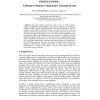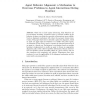99 search results - page 6 / 20 » Artificial agents learning human fairness |
132
click to vote
JAIR
2008
15 years 1 months ago
2008
It is well-known that acting in an individually rational manner, according to the principles of classical game theory, may lead to sub-optimal solutions in a class of problems nam...
118
click to vote
TSMC
2002
15 years 1 months ago
2002
Imitation is a powerful mechanism whereby knowledge may be transferred between agents (both biological and artificial). Key problems on the topic of imitation have emerged in vario...
140
click to vote
ITS
1992
Springer
15 years 5 months ago
1992
Springer
Abstract. This paper reports our research work in the new field of humancomputer collaborative learning (HCCL). The general architecture of an HCCL is defined. An HCCL system, call...
127
click to vote
CIA
2007
Springer
15 years 8 months ago
2007
Springer
When two or more agents interacting, their behaviors are not necessarily matching. Automated ways to overcome con
icts in the behavior of agents can make the execution of interacti...
114
click to vote
IEAAIE
2011
Springer
14 years 5 months ago
2011
Springer
Agent-based applications have the potential to assist humans in their lifestyle change, for instance eliminating addictive behaviours or adopting new healthy behaviours. In order t...



